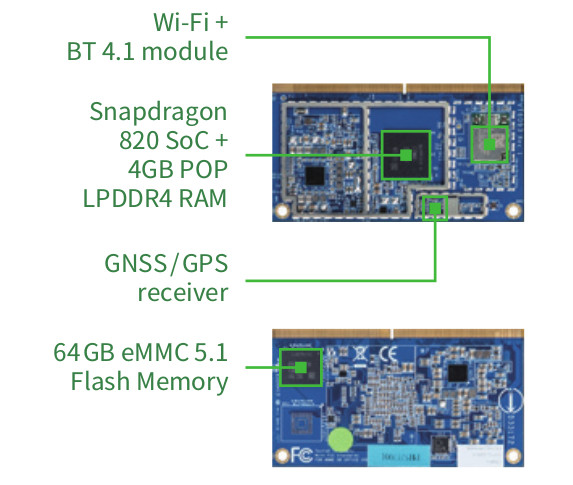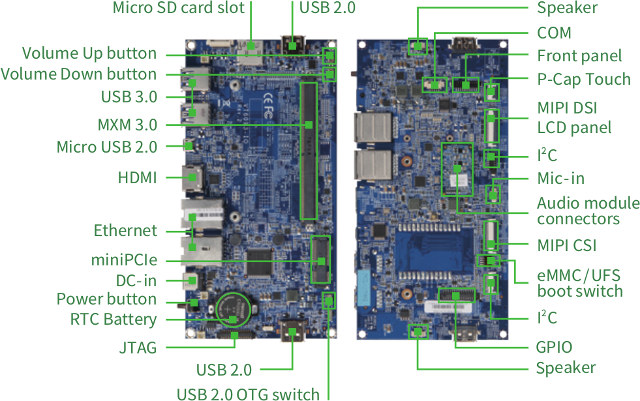At the end of last year, VIA launched SOM-9X20 system-on-module powered by Qualcomm Snapdragon 820 processor coupled with 4GB PoP LPDDR4 RAM, 64 GB eMMC flash, as well as WiFi + Bluetooth module, and a GNSS/GPS receiver.
The company introduced two software platform for the SoM and development kit at embedded world 2018: a Smart Machine Vision Platform for manufacturing management and control systems, and a Smart Recognition Platform for facial recognition, object detection, people counting & tracking, etc…
 VIA SOM-9X20 module specifications:
VIA SOM-9X20 module specifications:
- SoC – Qualcomm Snapdragon 820 quad- core processor with 2x high-performance Kryo cores up to 2.15GHz, 2x low power Kryo cores up to 1.593GHz, and Adreno 530 GPU supporting OpenGL ES 3.1/ GEP, GL4.4, DX11.3/ 4, OpenCL 2.0, Renderscript-Next
- System Memory – 4 GB POP LPDDR4 RAM
- Storage – 64 GB eMMC 5.1/ UFS 2.0 flash
- On-module Connectivity
- Wi-Fi 802.11 a/ b/ g/ n/ ac + Bluetooth 4.1 (QCA6174A -1) with two antenna connectors
- GNSS/GPS RF receiver (WGR7640) with antenna connector
- On-module Security – Trusted Platform Module TPM1.2 : ST33TPM12I2C
- I/Os via MXM 3.0 connector
- Display – HDMI 2.0, 2x MIPI DSI 4-Lane connectors
- Camera – 3x MIPI CSI 4-Lane connectors
- USB – 1x USB 3.0 OTG, 1x USB 2.0 host
- 1x SDIO
- Audio – 2 PCM/ MI2S
- Multi – function pins for UART, I2C, SPI , GPIO
- 1x JTAG
- 2x PCIe 2.0 ( 1-Lane)
- Dimensions – 8.2 cm x 4.5 cm
- Temperature Range – -20°C ~ 70°C
- Humidity – 0% ~ 95% ( non-condensing )
The module can runs Android 8.0, and a Linux 3.18.44 BSP is also under development. VIA SOMDB2 multi-I/O carrier board is available for development and/or integration into products.

The carrier board includes HDMI and MIPI DSI display outputs, a MIPI CSI camera connector, USB 2.0 and 3.0 ports, two Gigabit Ethernet ports, a mini PCIe slot, audio/speaker connectors, and more.
Apart from high- level description of their capability, VIA does not provide a lot of details for their smart platform. The Smart Recognition Platform is said to provide a flexible customization path for sophisticated security, surveillance, traffic monitoring, building management, and consumer engagement applications thanks to support for facial recognition, object detection, emotion detection, age and gender detection, and people counting & tracking, while the Smart Machine Vision Platform aims to improve manufacturing quality and yields by ensuring that all components, sub-assemblies, and products undergo thorough inspection thanks to up to eight cameras connected to the platform, various I/Os, and wireless connectivity options.
 Visit the SoM product page for more information about the module and baseboard themselves, as well as links to product briefs for the Smart Recognition and Smart Machine Vision platforms leveraging the hardware.
Visit the SoM product page for more information about the module and baseboard themselves, as well as links to product briefs for the Smart Recognition and Smart Machine Vision platforms leveraging the hardware.

Jean-Luc started CNX Software in 2010 as a part-time endeavor, before quitting his job as a software engineering manager, and starting to write daily news, and reviews full time later in 2011.
Support CNX Software! Donate via cryptocurrencies, become a Patron on Patreon, or purchase goods on Amazon or Aliexpress




“a Linux 3.18.44 BSP is also under development”! So while Greg had to temporarily revive the 3.18 kernel because some irresponsible vendors were still shipping products with it after its end of life, now one year later when it’s perfectly known that this one is dead, burried and broken, some vendors plan to start to use it ? We’re dreaming!
People, please never ever buy anything from such an irresponsible vendor. They’re putting thousands of bugs and vulnerabilities in your hands and either they don’t care (which is sad) or they don’t understand what they are doing nor the risks they’re making you take (which is even worse). Oh and by the way 3.18.44 misses 1.5 years of bug fixes (2091 patches), just compared to the latest 3.18.96 which itself should already not be touched.
I really don’t know when this stupidity will stop 🙁
@willy
Welcome to Asia, where software/software support is an afterthought…
a module with the carrier board would be a really great tool; sadly, as @willy says, an outdate kernel doesn’t bode well.
chances are the software support is going to be mix of all sorts of antique drivers and libraries, requiring a funky build chain which is fragile and nasty.
Well, this isn’t even generally true anymore. Some chip makers have made great efforts towards mainlining. And even some board vendors have made efforts trying to make their products work reasonably well on mainline, while they’re in the most difficult situation. At least I think that those having done these efforts once will be much more careful about the efforts it will require them for future chips. Hardkernel and FriendlyElec are two different but good examples.
So VIA here is simply doing crap and is bad even compared to new trends emering in Asia.
@willy
We seem to have very different experiences then.
Most of the companies I’ve had the (dis)pleasure to work with have mostly been relying on old software and have been less than keen to move to modern kernels, drivers and software. They’ve been slow to patch things or downplayed the issues, or simply don’t respond to submitted bugs.
Even talking to AllWinner and MediaTek recently, neither proved to be interested in offering much if any kind of support. RockChip seems a bit more willing at least, but I’ve as yet to try and work with them, so maybe that was just how things appeared when meeting with them at their HQ.
These companies expect “you” to do all the heavy lifting, while they provide sub-par development tools, incomplete tool chains and so on. The only half decent company was Ralink and the router/Wi-Fi division at MTk who came from Ralink. Even so, their software hard plenty of bugs and issues too, things that shouldn’t have been included in shipping software.
@TLS
I agree with you, that’s why I was saying “not generally true anymore” : some of them are improving. Some allwinner board vendors like FriendlyElec ship with mainline developed by the sunxi community and don’t use the allwinner crap anymore. Rockchip directly or indirectly tries to take care or mainlining. Samsung and Nexell seem not too far away either (allowing Hardkernel and FriendlyElec to ship on 4.14 LTS and 4.4 LTS respectively).
I’m personally fine with having a BSP relying on a modern LTS kernel that is expected to last approximately as long as the product, *if* it comes as a git tree that can receive merges from (or be rebased on) updated LTS versions of the same branch. Things are improving in certain areas, we have to encourage the good players there and blame the bad ones.
Of course, Allwinner’s 3.4.39 kernel has to be laughed at. Mtk is no better when you see this on the EdgeRouter-X I bought last year for my build farm :
admin@ubnt:~$ grep system /proc/cpuinfo
system type : MT7621
admin@ubnt:~$ cat /proc/version
Linux version 3.10.14-UBNT (root@edgeos-builder2) (gcc version 4.6.3 (Buildroot 2012.11.1) ) #1 SMP Mon Nov 14 03:56:39 PST 2016
Yes, 3.10.14… The day I lose the root password, it shouldn’t be too difficult to get root again!
@willy
The problem is that the mentality from the hardware makers is that supports costs money and they feel it’s a waste of money and resources, as they’re hardware companies, not software companies…
That would be fine if they offered open source drivers, but they don’t, as half of their chips contained licensed technology from a third party that doesn’t have open source drivers.
The problem is that the big chip guys aren’t a whole lot better. Even mighty Intel has been quite terrible on the Linux side of things. They make bold promises when a new chip launches and then delivers half arsed drivers that barely works. I know this as a fact, as I used to work for one of the big NAS manufacturers and they released products and claimed support for a whole bunch of things that at the end of the day, Intel decided not to fully support in the end, even though they’d promised support to sell in their chips to the NAS makers. Obviously this is some years ago, but I doubt it has changed much.
I’m not sure if Broadcom, Qualcomm and Marvell are much better on the router side either. The only platform companies seem to push updates for is Android, but that might be because Google is giving them hell if they don’t.
Combine this with lack of updates from the actual device makers and this is why we have so many insecure devices connected to the internet today. One of the few companies I’ve been impressed with when it comes to software updates is my old employer Securifi. They’re not perfect, but they’re pushing out software updates on a regular basis, although it seems like they’ve neglected their first product since a couple of years ago, which is a shame. That said, unless you sell a product with some kind of long term monetisation scheme, there’s obviously going to be a point in time where you have to say that this is it, we no longer support this product. The question is, when should this be?
@TLS
I agree with most of your points but not all, which shows that the truth lies somewhere between our experiences.
For my PC stuff, after having tried and suffered from the radeon and nvidia crap, I’ve switched to intel video only because it simply works out of the box and doesn’t generate 100W of heat to run emacs. Initial support is not perfect but it does the job pretty well. For network stuff, their products are quite good, and extremely well documented. I seem to remember that the well-known 82599 10G NIC has around 1300 pages of doc available online in PDF format. This is unmatched and gives good confidence that early issues will ultimately get fixed.
For having worked a bit on improving certain Marvell product support on Linux, I’d say that they are making efforts to get their products well supported in mainline though it’s obvious that it’s not their priority. I’ve had access to some of their docs after signing an NDA (less good than intel already), the doc is much less detailed, but generally usable to write drivers. I’m told that sometimes you have to try by yourself or ask their guys to get certain missing details. But it’s not that bad for such a company. I suspect they’re conscious that while a number of their products will power some NAS running their awfully bogus BSP, another significant number will run on servers, or openwrt-based devices that must not be neglected at all.
For the other ones, I don’t have experience.
@willy
Edgerouter X has much more recent kernel available in code from OpenWrt/LEDE project. I’m running LEDE 17.01.4 on mine. It has a 4.4.92 kernel and if you build from source you’ll get a more recent version.
@Ray Knight
Ah good to know, thanks for the hint, because I really don’t like the default system on it! (though I like the hardware). That said, I never log into it anymore now that I’ve installed what I needed, so I’ll probably not change it anymore. I’ll keep this in mind in case I buy another one.
The term used in the UK is “Slap Dash”. When it comes to getting the job done, cheap/fast and just enough till you are out the door with the cash. To me this is embodiment of commodity thinking, cheap mp3 cheap watch cheap SOM. Next! But the risk for added value vendors reusing cheap commodity SOM, which continues up the hidden platform chain of cheap integration, takes it into a whole new genre of complex fail. Ask a doctor if their ECG machine is linux 3.18 or 4.4, with FCC regs fixing this, ready and primed for remote hacking. or even a Genset from various integrated sources. Sooner or later this kind of stupidity is going to result in dead people with no callback to the SOM vendor.
@willy
Note that I said Intel “has been terrible”, they seem to have improved a lot since those days, even though they still have a lot of work to do. The issue I have with Intel is that they promise a lot and often under deliver on their promises. This means that hardware vendors can’t trust them, as they in turn end up getting scolded by their customers, as features don’t end up working as promised in the end.
Obviously the ARM guys are generally not much better and they make you pay extra licenses to get access to compilers, accelerators and what not to make their chips perform anywhere near where they promised. I’d almost go as far as to call this false marketing, as they often tout features that simply aren’t available unless you fork up for some extra software, which always comes in the form of a binary blob that you have zero control over.
Everyone in this industry is too paranoid and is doing everything they can to protect their “trade secrets”. I mean, seriously, how much trade secrets can there be in a network accelerator or a GPU driver? This really bugs me, as not only does it prevent these companies in turn to get help from their partners (as that’s what the device and software makers should be, no?), but it also means it can take months to fix what might be a simple problem, as the chip vendors don’t have enough resources to deal with it. This industry is broken in that sense, but it’s broken all the way from ARM and how they sell their IP and I’m sure the same applies for a lot of other IP companies.
@Boudyka
In Chinese it’s 差不多 – chàbuduō which means something along the lines of good enough, it’ll do, almost, not bad, near enough etc. It’s one of the most frustrating aspects of working with “Chinese” companies, as this mentality is found everywhere in society. Why make something really good if good enough will do? But as you say, some day this will cost people their lives and then what? This is also why a lot Japanese companies refuse to touch anything from China. Obviously there have been Japanese companies cutting corners as well, but they tend to have to deal with the falling out of whatever this corner cutting caused in the end. Sure, not every type of device needs to run the latest software or have the most secure chip inside it, but anything that has a wireless radio in it, or a means to connect to the Internet, should by default be as secure as possible.
kernel version still keep on 3.18.44, believe SoC vendor (Qualcomm) official support just on 3.18 for Q820 platform,
but I don’t know why not to apply TPM 2.0